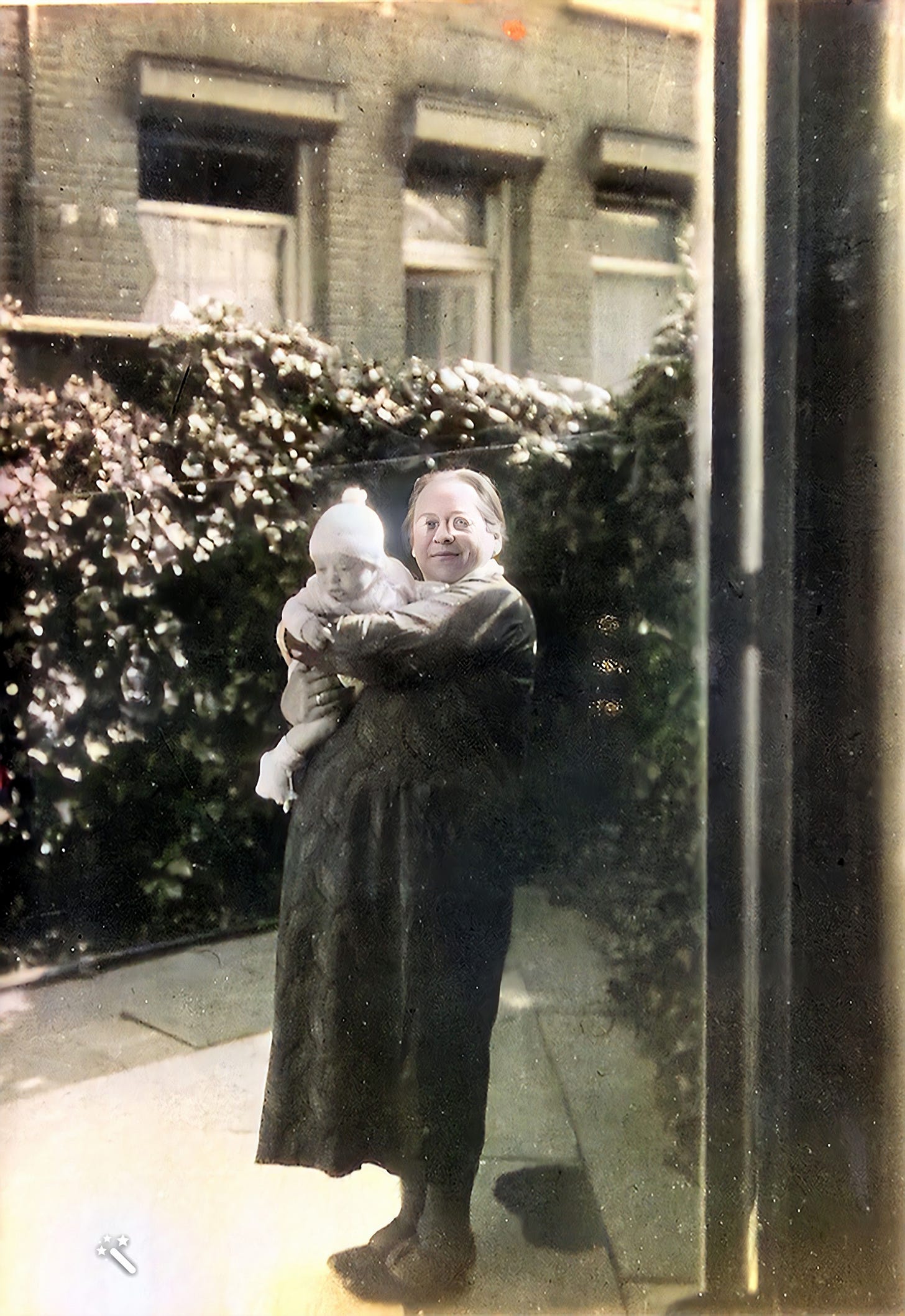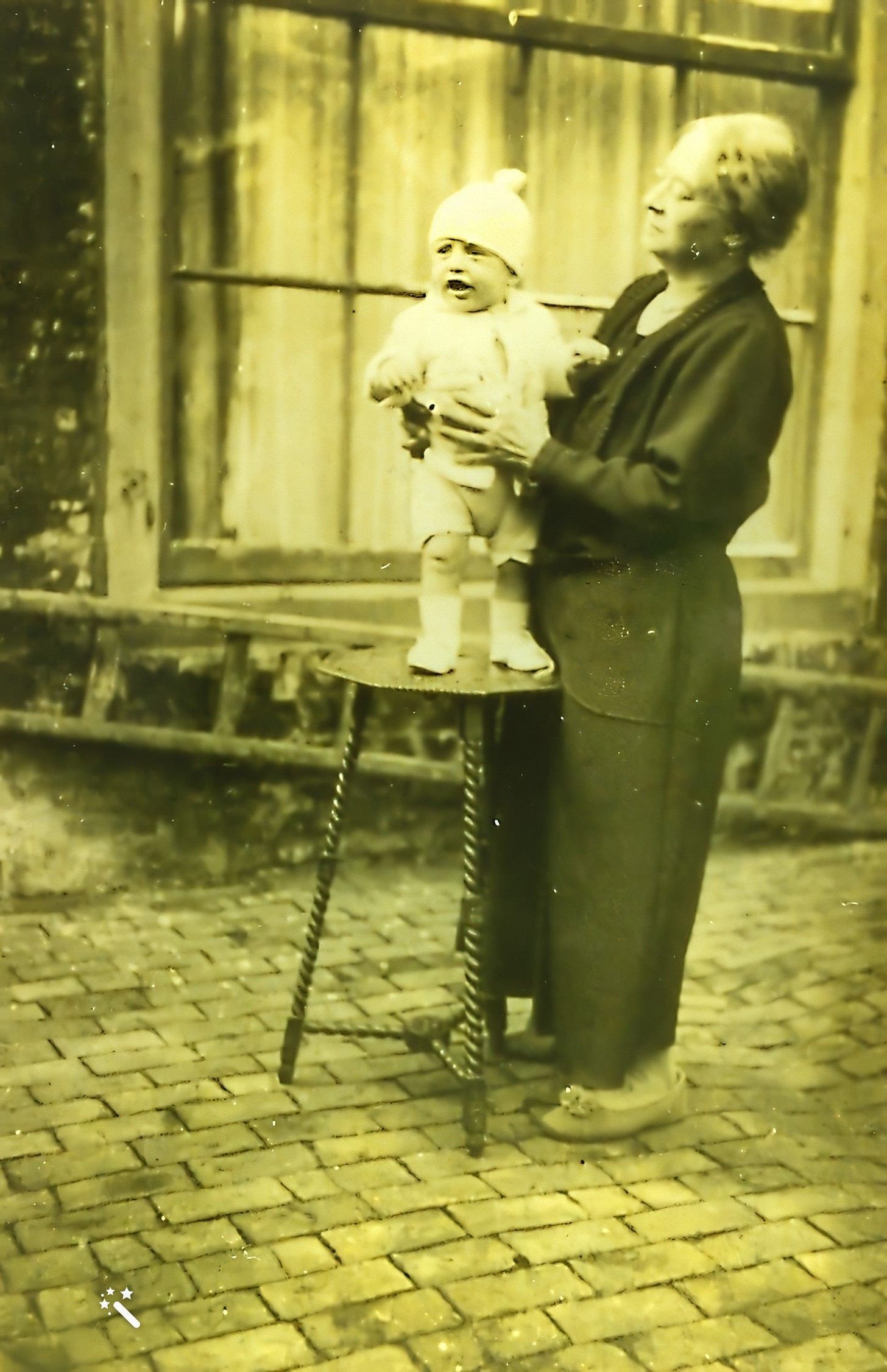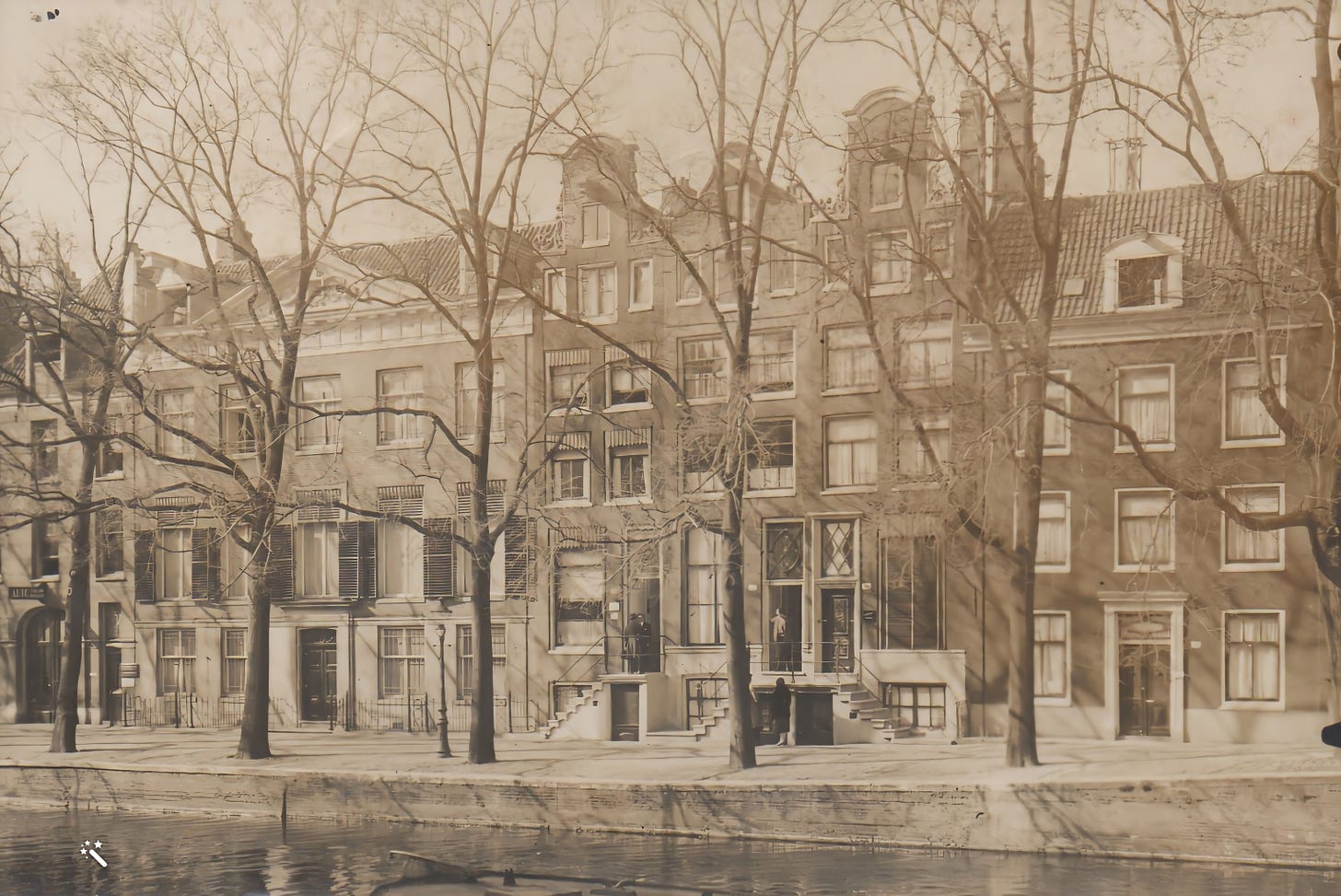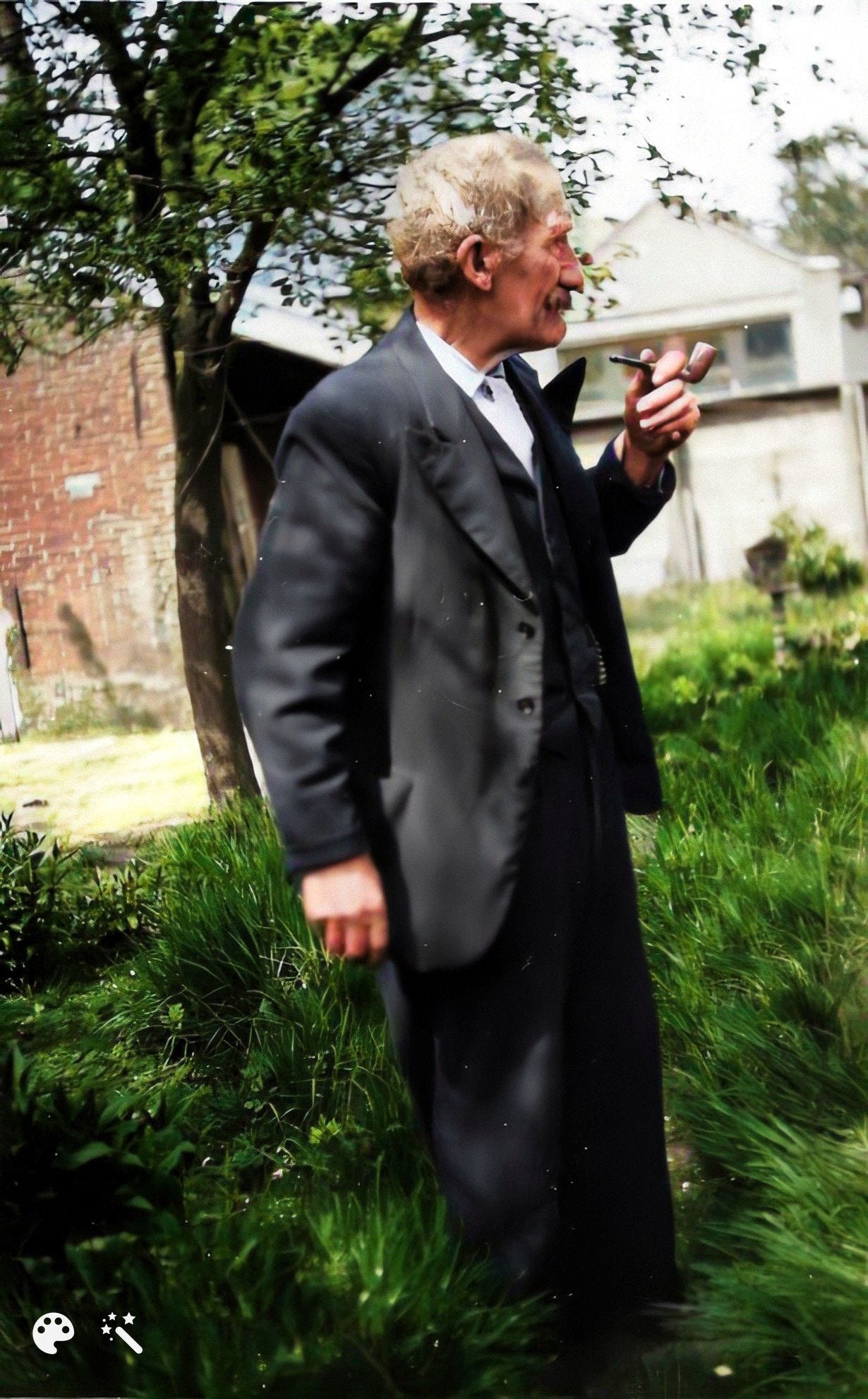“I'll tell you a bit more about those war days.”
THE LADY IN THE WHEELCHAIR
This is a true story, every word of it is as it really happened. I have never told the whole story to anyone, but I think I should tell it now.
I'll start my story in the early summer of the year 1942 when I was 9 years old. That day I planned to travel to my grandfather in Edam. Maybe I was still a bit young to be traveling on my own, but Mum and Dad wanted me to learn.
I had left my little bike in the bike shed at the railway station, bought my ticket - single third class to Edam, please - and was lucky enough to find a window seat. This part of the journey was no problem. Big Oma Cappèl lived in Amsterdam. So the three times I had gone to see her on my own made me feel like an experienced traveler.

My other grandmother, Little Oma, had lived much further away, in Edam. She had died the year before, and my grandfather, Opa Beukers, now lived all on his own in the big house on the corner of the Cheese Market. Not that the Cheese Market of Edam meant anything to me, the house just happened to be there.
Big Oma used to live in one of those large houses on a canal in Amsterdam. It was easy to get there, not like the trip I planned for today. You stayed on the train till you got to the big railway station at the end of the line. From the station, you took the tram with the number 25, got off at the stop on the bridge over the Keizersgracht, and walked a short distance along the canal. Easy.
That's how it was, not anymore. Big Oma was not allowed to keep her house, and Uncle Herman had to say goodbye to his boat. The house was taken over by the German soldiers and Oma, Uncle Herman, and Aunty Greet were put in a small unit in a high apartment building in a newer suburb.
The old Jewish quarter in Amsterdam was too full already, so the Jewish people from other parts of town, and later from the villages too, were made to live close together in that other area.
Today I would go to Edam instead. Mum had made me repeat the directions before I left. Rather than using the main exit from the railway station of Amsterdam, I had to leave by the exit on the other side. Then a ten-minute walk along the waterfront, where I had to catch a ferry across the harbor. The Edam and Volendam railway station was on the northern side of the harbor. A small station, with only one platform. There I would take the narrow-track train to Edam.
A group of German soldiers got onto the ferry behind me. They went straight to the bow, so I moved back a little and sat down on the corner of the engine room hatch. There were more people near that hatch, and anyway, I always liked looking at the big steam engine.
At the other shore, I hung back and waited until the soldiers got onto the first railway wagon. I didn't feel like sharing a carriage with those hated Germans!
That train was much smaller, friendlier somehow, especially the second wagon this time. No hard wooden seats like on the train to Amsterdam, but cane seats with loose backs which you could tilt either way. I found a window seat again, so I could look out over the endless paddocks. If you stared at a tree or house in the far distance, then the whole world seemed to spin around that point. Near your window, the world turned back fast. Cows and houses somewhat further away in the distance moved a lot slower, and that tree near the horizon was standing still.
At the station in Edam Opa waved at me even before the train had stopped and I could climb down.
'Let me carry your bag for you,' he said. 'You must be tired from that long trip. Tonight you can sleep in your Mum's old room.'
I liked that. Opa's house was just about as old as Big Oma's house, more than three hundred years, and to get to the room where Mum slept as a little girl you had to climb a steep ladder to the lower of the two attics. From Mum's window, I could just see the back door of the house of Uncle Frans. Uncle Frans was Opa's twin brother, who always smoked a curved pipe. Opa had a straight pipe, so it was easy to recognize them even from a distance.
Lately, they had not been smoking so much anymore, all the tobacco went to the German soldiers. So, Opa and Uncle Frans grew their own tobacco in the backyard, but there was never quite enough. Opa dried it over the coal range in the kitchen, on a long washing line near the ceiling. When it was all dry and crumbly they used it as chewing tobacco, dried it again, and smoked it in their pipes.
The following morning Opa gave me a piece of soft timber to carve. He was a wood-carver himself, but he always worked in oak. 'Better to learn it with softer woods first. Later on, you can work with oak too,' he told me.
He had just laid out his own chisels and knives when someone walked into the front door. Big Oma. I could feel Opa's surprise even without looking at him. She should not have come to Edam. Jewish people were never allowed to leave the town they lived in. At least she was not wearing the large yellow Star of David on her coat, so other people could not see so easily what she was. Even so, she should not have come to Edam.
Opa and Big Oma went into the front room, talked a little, and shortly Oma went away again.
'You are going to stay with your Oma for a few days,' Opa said when he came back to me. 'Do you know how to get there on your own? She has moved to a small apartment now, in Amsterdam South. I'll draw you a little map.'
His chin was moving in a funny sort of way when he took me back to the railway station. He was not crying, old men do not cry, but I thought he wanted to all the same.
Back in Amsterdam Oma was waiting for me at the top of the stairs: 'I'm so glad you could come. Uncle Herman and Aunty Greet are away for a few days and I was getting lonely. Tomorrow I want to take you to see an old friend of mine. She lives all on her own and she loves to see you too.'
I had met her friend before, an elderly lady in a wheelchair. Don't ask me what was wrong with her, in those days disabilities were never mentioned in front of children. All I know is that she kept her legs covered with a knitted kind of blanket as she wheeled herself around in her pharmacy. The counter was a bit lower than in other shops and she had the most fascinating gadget to lift the many bottles and jars of pills and powders off the shelves. Even off the highest ones near the top.
Whenever Oma took me to see her, I would sit in a corner behind the counter while the lady mixed strange-smelling medicines for her customers. She often talked for a long time with the people who came into her shop, listening to their problems, and giving advice with her gentle, soft voice.
I have tried many times to remember her name and her face, but I can't. I remember her voice and her hands when she counted out pills. I remember the shop door with the iron bell that rang all day long with every customer. I clearly remember the large glass vessels with colored water in the window - red, green, and yellow - and the jars with 'magic balls' that changed color when you sucked them slowly. But her name and her face are gone.
A few days later Big Oma put me on the tram to the railway station. She had sewn the yellow Star of David back onto her coat, clearly visible from afar.
That was the early summer of 1942.
A few days after that trip Aunty Greet came to see us in Bakkum. She came on her own.
Big Oma and Uncle Herman had gone into hiding. Where? Nobody knew. A man from the underground had taken them to their hiding place. Aunty Greet had no Jewish blood; she was not in immediate danger. We hoped.
Unless the Germans thought she might know where Big Oma and Uncle Herman were hiding. So, Aunty Greet also disappeared for a while.
To be continued.







